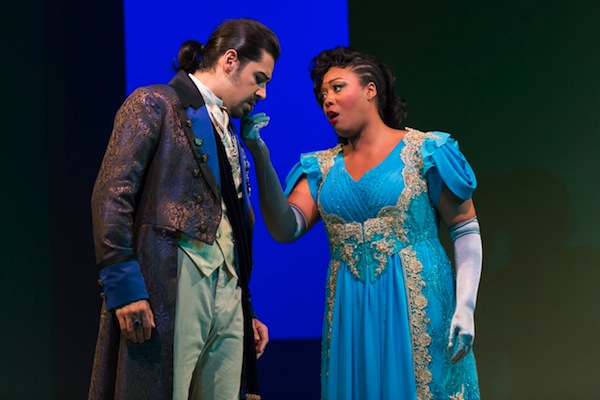Rarely heard Rossini comedy proves a delightful discovery at Wolf Trap

Richard Ollarsaba and Zoie Reams in Rossini’s “La pietra del paragone” at Wolf Trap Opera. Photo: Scott Suchman
In the fall of 1812, the 20-year-old Gioachino Rossini premiered his first commissioned opera at La Scala in Milan, weeks after Napoleon had led his Grande Armée into a disastrous battle outside Moscow. Among those who admired La pietra del paragone was Napoleon’s general in command of troops in Milan, who happily decided to exempt the young composer from military service.
Wolf Trap Opera has resurrected this mostly forgotten comic gem in a charming production at the Barns on Sunday afternoon.
Luigi Romanelli, one of La Scala’s house librettists, created a story about a wealthy nobleman, Count Asdrubale. Faced with the choice of three women who want to marry him, the Count devises a ruse to test them. Settling on the lovely Clarice–the only one to remain faithful when he feigns the loss of his fortune–he is then put to her test in return. These methods of examining the purity of others’ intentions are the “touchstone” of the opera’s title.
The work is a delightful rarity offering a plethora of roles for the rising singers Wolf Trap Opera invites to northern Virginia every summer. Among many excellent vocal discoveries is mezzo-soprano Zoie Reams, who as Clarice displayed a powerful, honeyed tone, the registers fluently joined from bottom to top and with flawless runs. She used different vocal colors and stage mannerisms to distinguish her female persona from the soldier masquerade Clarice takes on, pretending to be her twin brother.
In an unusual move Rossini gave the romantic lead to a bass, sung here with resounding force and emotional intensity by Richard Ollarsaba. Fine examples of his musical sensitivity and comic skill came in the echo part of Clarice’s Act I cavatina “Quel dirmi, oh dio!” and the Count’s nasal voicing of the mysterious creditor who appears to bankrupt him. Complete with leopard skin, multicolored turban, and boa constrictor around his neck, Ollarsaba was one of the evening’s comic highlights.
Tenor Alasdair Kent displayed serious bel canto credentials as Giocondo, Asdrubale’s friend, with finesse in the melismatic pyrotechnics and a lyrical legato tone up to some very high notes. South Korean baritone Kihun Yoon mollified his puissant voice as Macrobio, a send-up of newspaper critics, who gets his comeuppance in a hilarious duel scene with the Count and Giocondo. Baritone Shea Owens was an antic, full-voiced Pacuvio, the poetaster who comes up with a dreadful sestina about a disgusting shadow in the “Missipipi, pipi, pipi.”
Scholar Richard Osborne wrote that in this opera Rossini achieved “an almost Mozartian tenderness of mood.” Nowhere does Rossini’s absorption of Mozart’s style come across more than in the many marvelous ensembles. This simple but well-directed production by E. Loren Meeker brought these complex moments to life, with varied and defined characterization throughout the cast and down to the robust male chorus (prepared by David Hanlon).
The hunt scene, darkened by a Rossinian orchestral storm, was particularly hilarious, with cutouts of menacing animals waved threateningly at the terrified Pacuvio. The only misstep was in the two other women who vie for the Count (Summer Hassan’s acidic Donna Fulvia outshining Megan Mikailovna Samarin’s Baroness Aspasia), whose outrageous costumes (designed by Erik Teague) and mannerisms made the Count’s need to test the three women seem unnecessary.
Conductor Antony Walker, music director of Washington Concert Opera, led with a sure hand in the pit. Orchestra playing was somewhat uneven, strong in the woodwinds and horns but with some sour intonation from the small string section. The set concept designed by Erhard Rom, with rotating set pieces that alternated backdrop niches with plain color, included a precarious walkway over the pit. In this limited space, Walker often had to make one hand visible to the singers while the other was below the stage for the orchestra. When the singers moved behind him, some misalignments were noticeable.
According to the late musicologist Philip Gossett, in this opera Rossini began his practice of foisting the composition of the secco recitatives on assistants, doing so for the entire second act here. Playing a grand piano at the corner of the house, Nicolò Sbuelz accompanied these recitatives with a light touch. Though cut significantly, they added charming harmonic color and comic brilliance to these vivacious musical bits that one might otherwise overlook.
La pietra del paragone runs through July 1. wolftrap.org; 877-965-3872.

Posted Jun 26, 2017 at 12:18 pm by Laura Youens
This is perfect! You’re quite right about the two ladies and the string section, but what a fantastic production otherwise. I was delighted to have been able to see and hear it.